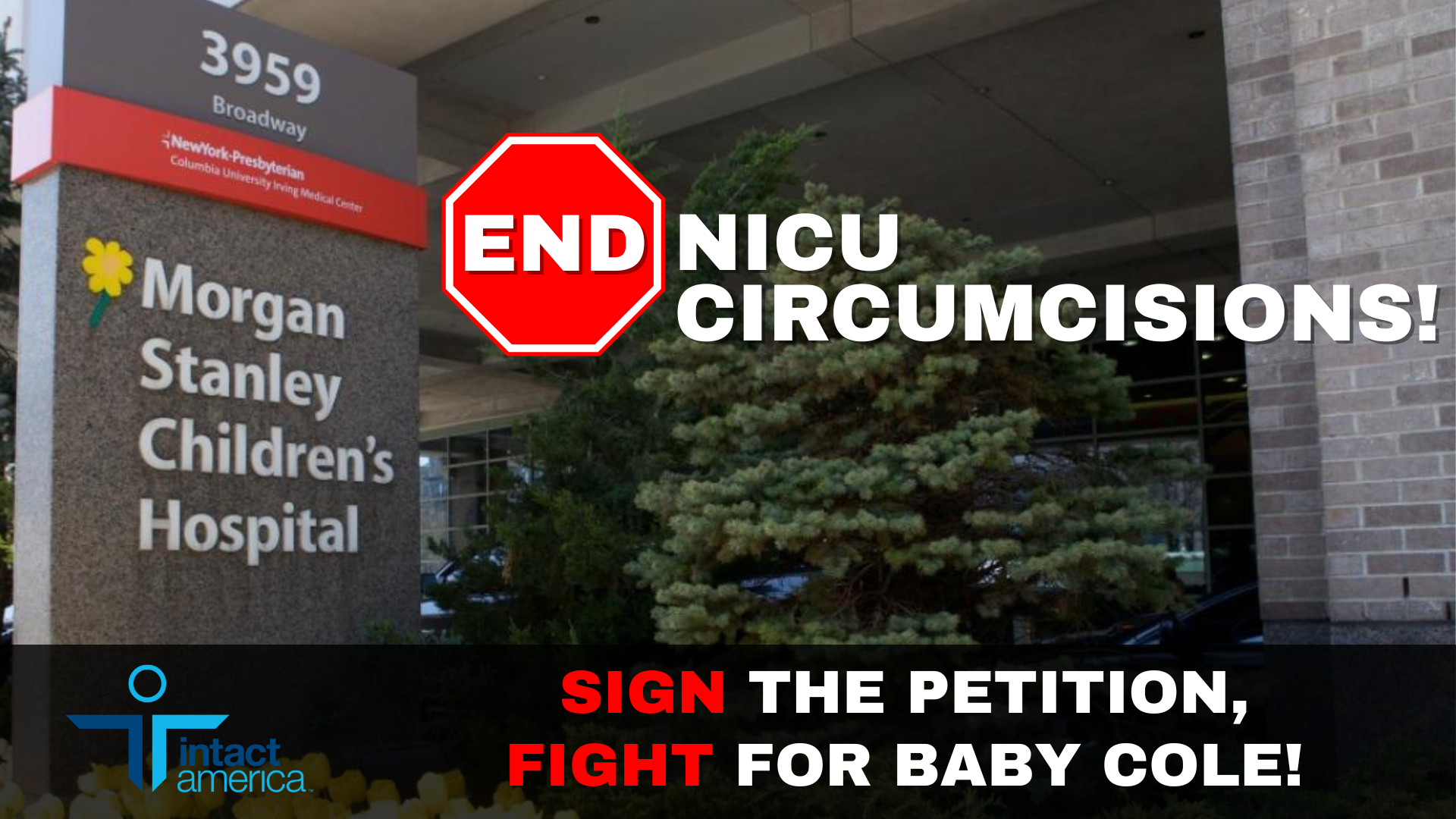For old-guard intactivists, it can be difficult to work up enthusiasm for the predictable details and epiphanies that appear in mainstream media coverage about circumcision. What does excite us is seeing a major media outlet publish an intelligent, long-form piece that shakes loose the typical circumcision dialogue within a given community and nudges it in the right direction.
A panoramic article on the religious and cultural aspects of circumcision just appeared in Haaretz, Israel’s oldest and most influential daily newspaper. “Even in Israel, more and more parents choose not to circumcise their sons,” the headline glows. The article’s author, Netta Ahituv, covers the territory of conformity, medicine, marital and family discord, and religious identity.
You must read this epic piece. I cannot possibly do it justice, but here are some takeaways: Even in Israel, having an intact penis is at worst no big deal. The dissenting parent gets over it, the grandparents love the kid anyway, and there are no associated medical or “hygiene” problems. Cutting off the foreskin, on the other hand, is painful for the baby and decreases sexual sensitivity for the man. And, perhaps the bottom line of concern to Haaretz’s readership, a boy who is born Jewish, i.e., to a Jewish mother, is still a Jew – whether he is circumcised or intact.
A different kind of reportage that begs critique comes from the august folks at the Centers for Disease Control, whose every politically-correct attempt to navigate the world of ritual circumcision paints them further into a corner of fainthearted health policy and hypocrisy. The June 8 edition of their Mortality and Morbidity Weekly Report featured an article on neonatal herpes simplex virus (HSV) infection in New York City infants, resulting from ritual circumcisions featuring “direct orogenital suction.” For those of you who may have been blissfully ignorant of this custom, called metzitzah b’peh, I’ll explain. In some ultra-Orthodox Jewish ritual circumcisions, the mohel (ritual circumciser) sucks the baby’s penis to remove the blood, after severing the foreskin. If the mohel has oral herpes, the virus can be transmitted to the baby. Herpes simplex infection in a neonate is devastating, and can cause seizures, psychomotor retardation, spasticity, blindness, learning disabilities and death. Of the eleven cases reported in the article, two babies died.
The CDC states, “Preventing the practice of direct orogenital suction is difficult, because ritual circumcision is a religious practice that usually occurs outside of health-care facilities.” This “difficulty” didn’t stop U.S. lawmakers from prohibiting the genital cutting of girls, and it doesn’t stop us from passing laws against child sexual assault, nor prosecuting the perpetrators. But the CDC, the largest public health organization in the world, clearly eschews any proscriptive measures to protect baby boys, instead recommending, “Physicians should counsel parents considering out-of-hospital Jewish ritual circumcision about the risks associated with direct orogenital suction,” and health departments should – if they discover a case of HSV caused by metzitzah b’peh – “notify the mohel… so that he can voluntarily cease putting infants at risk.” (Italics mine.)
Note that the current head of the Centers for Disease Control is Thomas Frieden, MD. Frieden was the Commissioner of Health and Mental Hygiene in New York City in 2005, when one baby died and two more were permanently disabled following metzitzah b’peh. His agency, responding to an outcry from ultra-Orthodox community members who insisted that any prohibition against sucking the blood from a baby’s penis was a violation of their religious freedom, opted to put the burden on parents, “strongly advis[ing]” them that they “explore all options” and “not have metzitzah b’peh (direct oral suctioning) performed during the [circumcision].”
A brief article in Pediatric News, which came to me courtesy of a member of Intact America’s board of health professionals, interested me more for what I could read into it then for what it was meant to address. It gives a low-tech solution for a painful problem – a man or boy catching his penis in a zipper. The recommended treatment? Douse the genitals in mineral oil, wait thirty minutes, and (though the pants may be ruined) the skin will release from the zipper’s teeth. What’s refreshing about this article is, for one, the author does not blame the foreskin (any part of a man’s penis can get caught in a zipper), or recommend cutting it off. Also, from the headline, it appears that he actually (and correctly) considers the foreskin to be part of the penis, not an ancillary flap of skin.
More alarming, though, is the article’s discussion of another common approach to the problem – administering a penile block (which involves injecting the penis to anesthetize it) before forcibly pulling the zipper away. (Keep in mind that penile blocks are now the anesthetic of choice for cirumcision among doctors who have heard the message that cutting off a baby’s foreskin with no pain-control is inhumane.) Referring to this technique, the author, a pediatrician, says “Most kids would rather die with that zipper attached to them than have you do a penile block.” This article, then, sends a clear message that injections to numb the penis are themselves excruciating. The alternative is obvious – no circumcision, and thus no need for anesthetic.
Finally, on a lighter note, intactivist Dan Bollinger was chosen by Yahoo as having written the “best answer” to the question, Are there really any benefits to circumcising a penis? Click here to read Dan’s answer.*
As always, I would love to hear your feedback. And please forward this post to your friends!
–Georganne Chapin
* For those fortunate enough to know him, Dan Bolinger is an intactivist’s intactivist. Few take the subject more seriously than Dan. While there are some who find little or no humor in the topic of circumcision, for others, laughter can be the gateway to understanding a previously unexplored subject for the first time. There are many paths to enlightenment.







wildwahinepaddler
June 22, 2012 6:17 pmIt was most alarming to read that the CDC was only “recommending” that oral suction of the babies penis not be performed…..and their suggestion to know who the Mohels were that were putting babies at risk….so they could ask them to not do it? and as much as I respect Dan and have read much of his material…..I am one of those who doesn’t find one bit of humor surrounding circumcision, but his “best answer” was creative and I hope you are right about some humor being the gateway to understanding (at least for some people).
Lisa Braver Moss
June 22, 2012 9:20 pmHere’s a piece I wrote for the Huffington Post about the metzitzah b’peh issue —
http://www.huffingtonpost.com/lisa-braver-moss/metzitzah-bpeh-circumcision-ritual-inconsistent-with-jewish-principles_b_1598281.html
Intact America
June 26, 2012 4:47 pmThe importance of Lisa’s article appearing in Huffington Post cannot be overstated. For the mainstream American media to solicit and publish articles about circumcision as a problem means that the intactivist perspective – whether with regard to religious or medicalized circmcision – is no longer considered fringe.
Georganne
Daniel
June 23, 2012 10:20 pmI could be incorrect, but it is my understanding that the user who asks a question on Yahoo Answers is the one who chooses the “best answer”. Yahoo the company isn’t involved at all on that level.
As you see, next to “Best answer” it says “Chosen by asker”
Hope that helps…
anonymous guy
June 28, 2012 3:16 pmCorrect: either the asker can select the best answer, or if he or she doesn’t, users of the site can vote on which one is best. Having your answer chosen isn’t the most significant thing in the world, though I suppose it’s better than if any incorrect advice was selected.
Dan Bollinger
June 25, 2012 9:30 amI think the Pediatric News article illustrates a changing attitude toward the foreskin as being a normal, vital part of the whole penis.
Regarding zipper entrapment, if you are going to destroy the pants (better the pants than the penis) there is no need to let the poor guy suffer for thirty minutes. Instead, use a pair of diagonal cutters (electricians nippers) and cut the zipper below the entrapment. The zipper teeth will fall away without causing more harm.
Michelle2
June 25, 2012 3:32 pmYes, I thought the same thing while reading the article. Thirty minutes is too long to wait.
wildwahinepaddler
June 25, 2012 6:17 pmIt just seems like such a weird thing to bring up….a penis getting caught in a zipper. I don’t begin to understand how this applies to foreskin or any skin when zipping up pants. It just seems to me to be more of a “too much in a hurry” problem…which could apply to females as well as males….and could affect other parts of the body…but here we still are focusing on the male penis! I understand that having this happen to a penis would be very painful…but if it happened to a finger it would also be painful. Why not focus on being more careful…rather than focus on this happening to a penis?
anonymous guy
June 28, 2012 3:07 pmWouldn’t the easiest way be to simply pull the zipper teeth apart? Waiting even a few minutes while searching for tools to do it otherwise would be agonizing, I’d imagine. A much better solution is to wear underpants – and believe me, I’ve learned the hard way. 🙁
Michelle2
June 25, 2012 3:35 pmI could not read the Jewish article without subscribing. Any way to post the article here?
thanks.
Sus
June 25, 2012 10:00 pmWhen I first went to the article, you didn’t have to subscribe to read it. That was at least 10 days ago. When I first read your comment, I thought maybe looking at the site on a different device would make it viewable. I’ve looked on my computer & iphone & both require a subscription. I wonder why it changed.
Joseph4GI
June 25, 2012 3:50 pmCorrect me if I’m wrong, but isn’t Frieden JEWISH???
This should tell you why for the second time in a row, he keeps letting ultra-Orthodox Jews that give babies herpes off the hook.
Could we get someone who’s competent and actually interested in preventing disease at the Centers for Disease Control please?
Frieden has shown his ineptness at doing his job TWICE already,
Pingback: Intact America piece « Coffee and Kids
September 18, 2012 10:24 pmhier gibt esblog
February 17, 2014 6:06 pmof course much like your website and you have got to examination the particular transliteration with a few of you. Most of them are generally filled using spelling concerns we still find it pretty troublesome to inform the certainty nonetheless Let me undoubtedly go back just as before.